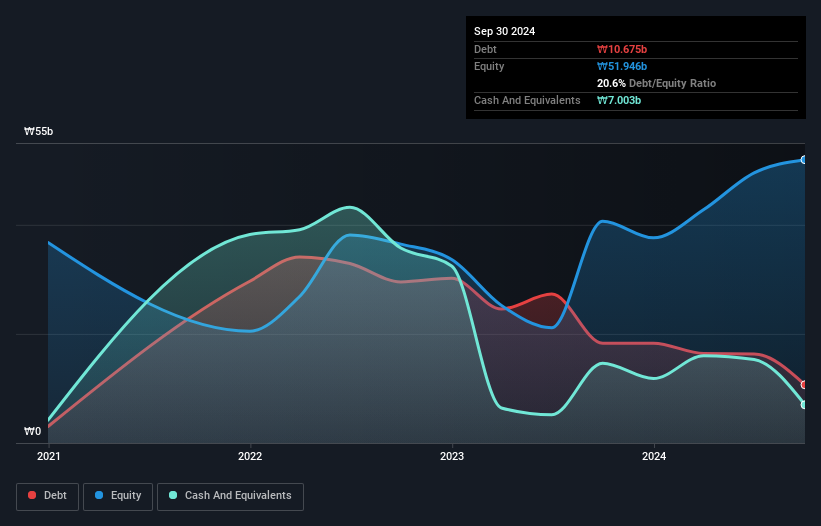David Iben put it well when he said, 'Volatility is not a risk we care about. What we care about is avoiding the permanent loss of capital.' So it seems the smart money knows that debt - which is usually involved in bankruptcies - is a very important factor, when you assess how risky a company is. Importantly, PCL, Inc. (KOSDAQ:241820) does carry debt. But the more important question is: how much risk is that debt creating?
When Is Debt A Problem?
Generally speaking, debt only becomes a real problem when a company can't easily pay it off, either by raising capital or with its own cash flow. Part and parcel of capitalism is the process of 'creative destruction' where failed businesses are mercilessly liquidated by their bankers. However, a more common (but still painful) scenario is that it has to raise new equity capital at a low price, thus permanently diluting shareholders. Of course, plenty of companies use debt to fund growth, without any negative consequences. The first step when considering a company's debt levels is to consider its cash and debt together.
See our latest analysis for PCL
What Is PCL's Debt?
The image below, which you can click on for greater detail, shows that PCL had debt of ₩10.7b at the end of September 2024, a reduction from ₩18.3b over a year. On the flip side, it has ₩7.00b in cash leading to net debt of about ₩3.67b.

How Strong Is PCL's Balance Sheet?
According to the last reported balance sheet, PCL had liabilities of ₩11.3b due within 12 months, and liabilities of ₩3.28b due beyond 12 months. Offsetting these obligations, it had cash of ₩7.00b as well as receivables valued at ₩4.40b due within 12 months. So its liabilities outweigh the sum of its cash and (near-term) receivables by ₩3.16b.
Of course, PCL has a market capitalization of ₩35.1b, so these liabilities are probably manageable. However, we do think it is worth keeping an eye on its balance sheet strength, as it may change over time. There's no doubt that we learn most about debt from the balance sheet. But you can't view debt in total isolation; since PCL will need earnings to service that debt. So if you're keen to discover more about its earnings, it might be worth checking out this graph of its long term earnings trend.
In the last year PCL wasn't profitable at an EBIT level, but managed to grow its revenue by 113%, to ₩8.5b. So there's no doubt that shareholders are cheering for growth
Caveat Emptor
While we can certainly appreciate PCL's revenue growth, its earnings before interest and tax (EBIT) loss is not ideal. Its EBIT loss was a whopping ₩15b. Considering that alongside the liabilities mentioned above does not give us much confidence that company should be using so much debt. Quite frankly we think the balance sheet is far from match-fit, although it could be improved with time. However, it doesn't help that it burned through ₩15b of cash over the last year. So in short it's a really risky stock. There's no doubt that we learn most about debt from the balance sheet. However, not all investment risk resides within the balance sheet - far from it. For example, we've discovered 4 warning signs for PCL (2 shouldn't be ignored!) that you should be aware of before investing here.
Of course, if you're the type of investor who prefers buying stocks without the burden of debt, then don't hesitate to discover our exclusive list of net cash growth stocks, today.
New: Manage All Your Stock Portfolios in One Place
We've created the ultimate portfolio companion for stock investors, and it's free.
• Connect an unlimited number of Portfolios and see your total in one currency
• Be alerted to new Warning Signs or Risks via email or mobile
• Track the Fair Value of your stocks
Have feedback on this article? Concerned about the content? Get in touch with us directly. Alternatively, email editorial-team (at) simplywallst.com.
This article by Simply Wall St is general in nature. We provide commentary based on historical data and analyst forecasts only using an unbiased methodology and our articles are not intended to be financial advice. It does not constitute a recommendation to buy or sell any stock, and does not take account of your objectives, or your financial situation. We aim to bring you long-term focused analysis driven by fundamental data. Note that our analysis may not factor in the latest price-sensitive company announcements or qualitative material. Simply Wall St has no position in any stocks mentioned.
About KOSDAQ:A241820
PCL
Provides multiplex in vitro diagnostic (IVD) products and platform services.
Moderate with worrying balance sheet.
Market Insights
Community Narratives



